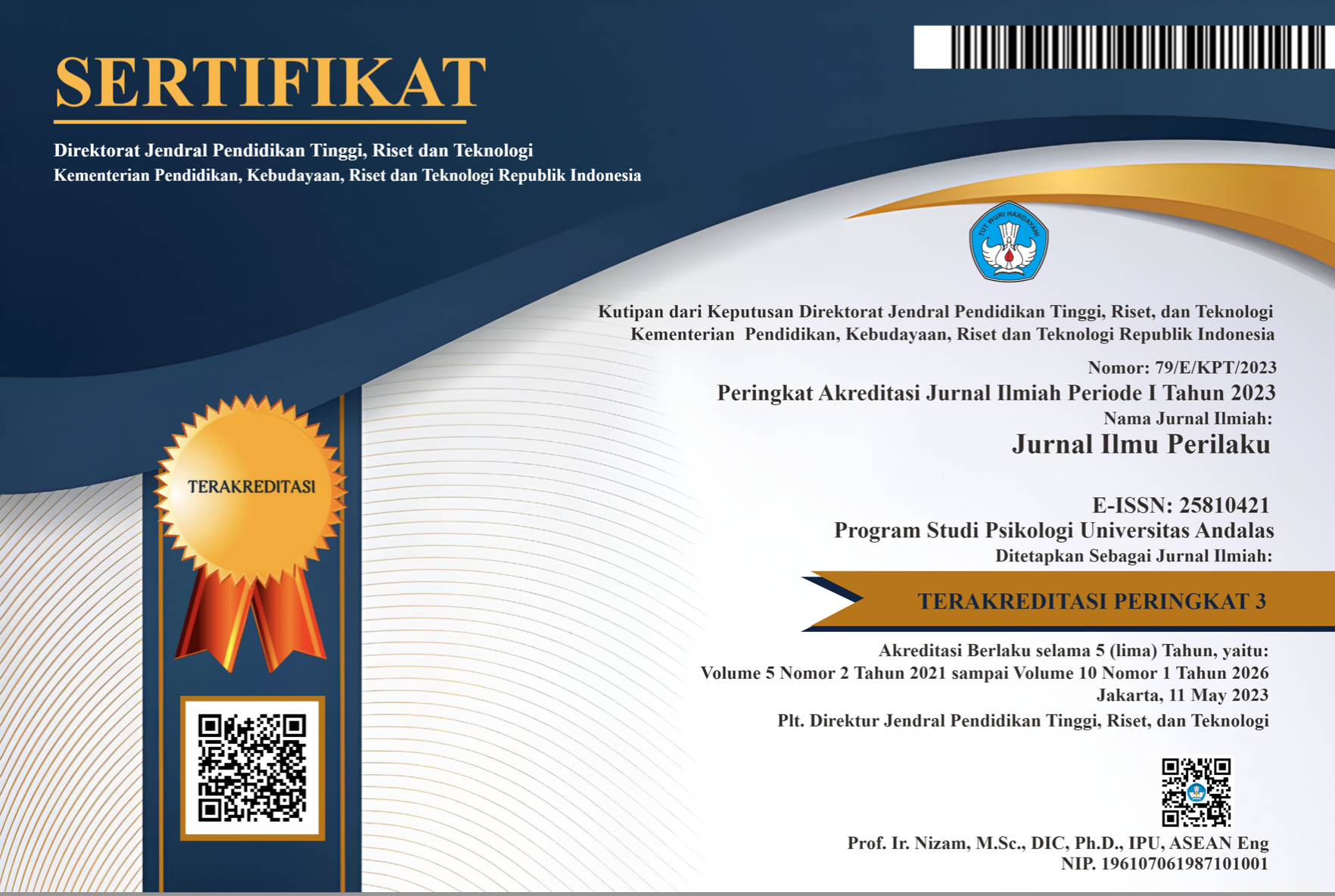Dinamika Psikologis Remaja Korban Perceraian: Sebuah Studi Kasus Kenakalan Remaja
Abstract
Parental divorce can be a very stressful experience for adolescents. Adolescents will lose their parent figure and feel different atmosphere in the family. This study aimed to identify the psychological dynamics of adolescents that have experienced parental divorce developing into juvenile delinquency. This was a case study research. The subject of this study was a 13-year-old boy with divorced parent and lived in an orphanage. Data were collected through observations, interviews, and psychological tests. The result revealed that juvenile delinquency happens because of the need of gaining attention from others. The wrong mindset "I will get attention if I commit juvenile delinquency and disturb others" became the basis of the subject’s socially inappropriate behaviors. It was the way to compensate his inferior feelings to the environment.
Downloads
References
American Psychiatric Association. (2000). Diagnostic and statistical manual of mental disorders fourth edition text revision. Washington, DC: Author.
Aseltine, R. H. (1992). The impact of parental divorce on adolescents (Disertasi tidak dipublikasikan). University of Michigan, Michigan.
Babalis, T., Tsoli, K., Nikolopoulos, V., & Maniatis, P. (2014). The effect of divorce on school performance and behavior in preschool children in Greece: An Empirical Study of Teachers’ Views. Scientific Research, Psychology, 5(1), 20-26.
Badan Pusat Statistik. (2017). Nikah, Talak dan Cerai, serta Rujuk, 2012–2015. Diunduh dari https://www.bps.go.id/linkTableDinamis/view/id/893
Beck, J. S. (2011). Cognitive behavior therapy: Basics and beyond (2nd ed.). New York: The Guilford Press.
Blattner, M. C. C., Liang, B., Lund, T., & Spencer, R. (2013). Searching for a sense of purpose: The role of parents and effects on self-esteem among female adolescents. Journal of Adolescence, 36, 839–848.
Colin, V. L. (1996). Human attachment. New York: McGraww-Hill Companies, Inc.
Çivitci, N., Çivitci, A., & Fiyakali, N. C. (2009). Loneliness and life satisfaction in adolescents with divorced and nondivorced parents. Educational Sciences: Theory & Practice 9(2), 513-525
Dewi, P. S. & Utami, M. S. (2008). Subjective well‐being anak dari orang tua yang bercerai. Jurnal Psikologi, 35(2), 194 – 212.
Emam, M. M. & Abu-Serei, U. S. (2014). Family functioning predictors of self-concept and self-esteem in children at risk for learning disabilities in Oman: Exclusion of parent and gender contribution. International Education Studies, 7(10), 89-99.
Esmaeili, N. S. & Yaacob, S. N. (2012). Correlates of self-esteem among adolescents of divorced families. Archives Des Sciences, 65(8), 52-59.
Eymann, A., Busaniche, J., Llera, J., Cunto, C. D., & Wahren, C. (2009). Impact of divorce on the quality of life in school-age children. Jornal de Pediatria, 85(6), 547-552.
Fagan, P. F. & Churchill, A. (2012). The Effects of Divorce on Children. Marri Research. Diunduh dari http://marri.us/wp-content/uploads/publications/research_papers/EF12A22. pdf
Fry, J. A. (2010). Change in family structure and rates of violent juvenile delinquency (Tesis tidak dipublikasikan). Virginia Polytechnic Institute and State University, Virginia.
Hurlock, E. B. (2002). Development psychology: A life-span aprroach (Psikologi Perkembangan, Suatu pendekatan sepanjang rentang kehidupan). Diterjemahkan oleh Istiwidayanti dan Soedjarwo. Jakarta: Erlangga.
Kagan, J. (1999). The role of parents in children’s psychological development. Pediatrics, 104(1). 164-167.
Lansford, J. E. (2009). Parental divorce and children's adjustment. Perspectives on Psychological Science, 4(2), 140-152
Leon, K. (2003). Risk and protective factors in young children’s adjustment to parental divorce: a review of the research. Family Relations, 52, 258-270.
Mackay, R. (2005). The impact of family structure and family change on child outcomes: a personal reading of the research literature. Social Policy Journal of New Zealand, 4, 111-133.
Mahmud, Z., Yunn, Y. P., Aziz, R., Salleh, A., & Amat S. (2011). Counseling children of divorce. World Applied Sciences Journal 14 (Learning Innovation and Intervention for Diverse Learners), 21-27.
Mishra, S. & Shanwal, V. K. (2014). Children’s self-concept and perception of parents’ behavior. Children’s Self-Concept and Perception of Parents’ Behavior, 1(1), 28-30.
Morrison, D. R. & Coiro, M. J. (1999). Parental conflict and marital disruption: Do children benefit when high-conflict marriages are dissolved? Journal of Marriage and Family, 61(3), 626-637.
Needle, R. H., Su, S. S., & Doherty, W. J. (1990). Divorce, remarriage, and adolescent substance use: A prospective longitudinal study. Journal of Marriage and Family, 52(1), 157-169
Poerwandari, K. (2001). Pendekatan kualitatif untuk penelitian perilaku manusia. Jakarta: LPSP3 Fakultas Psikologi Universitas Indonesia.
Pálmarsdóttir, H. M. L. (2015). Parental divorce, family conflict and adolescent depression and anxiety (Tesis tidak dipublikasikan). Reykjavik University, Reykjavik.
Santrock, J. W. (2011). Life-Span Development (13th Ed.). New York: McGraw-Hill.
Singh, H. & Kiran, U. V. (2012). Effect of single parent family on child delinquency. International Journal of Science and Research (IJSR), 3(9), 866-868.
Schultz, D. (1991). Psikologi pertumbuhan, model-model kepribadian sehat. Yogyakarta: Kanisius.
Thompson Jr, R. G., Lizardi, D., Keyes, K. M., & Hasin, D. S. (2008). Childhood or adolescent parental divorce/separation, parental history of alcohol problems, and offspring lifetime alcohol dependence. Drug and Alcohol Dependence, 98, 264–269.
Thornberry, T. P., Smith, C. A., Rivera, C., Huizinga, D., & Stouthamer-Loeber, M. September (1999). Family disruption and delinquency. Juvenile Justice Bulletin. 1-7.
Uphold-Carrier, H. & Utz, R. (2012). Parental divorce among young and adult children: A long-term quantitative analysis of mental health and family solidarity. Journal of Divorce & Remarriage, 53(4), 247-266.
Yabiku, S. T., Axinn, W. G., & Thornton, A. (1999). Family integration and children's self‐esteem. American Journal of Sociology, 104(5), 1494-1524.
Weber, A. D. (2001). Influence of family environment on self-esteem and hostility (Disertasi tidak dipublikasikan). Southern Illinois University, Carbondale.
Wells, L. E. & Rankin, J. H. (1991). Families and delinquency: A meta-analysis of the impact of broken homes. Social Problems, 38(1), 71-93.
Wenar, C. & Kerig, P. (2006). Developmental psychopathology: From infancy through adolescence (5th Ed.). London: McGraw-Hill.
Wilding, C., Milne, A. (2008). Cognitive behavioural therapy. London: Hodder Headline.
Wyman, P. A., Cowen, E. L., Hightower, A. D., Pedro-Carroll, J. L. (1985). Perceived competence, self-esteem and anxiety in latency-aged children of divorce. Journal of Clinical Child Psychology, 14(1), 20-26.

This work is licensed under a Creative Commons Attribution-NonCommercial-ShareAlike 4.0 International License.
The non-commercial use of the article is governed by the Creative Commons Attribution license as currently displayed on Creative Commons Attribution-NonCommercial-ShareAlike 4.0 International License.
JIP's spirit is to disseminate articles published are as free as possible. Under the Creative Commons license, JIP permits users to copy, distribute, display, and perform the work for non-commercial purposes only. Users will also need to attribute authors and JIP on distributing works in the journal.
Please find the rights and licenses in Jurnal Ilmu Perilaku (JIP).
- License
The non-commercial use of the article will be governed by the Creative Commons Attribution license as currently displayed on Creative Commons Attribution-NonCommercial-ShareAlike 4.0 International License.
- Author’s Warranties
The author warrants that the article is original, written by stated author(s), has not been published before, contains no unlawful statements, does not infringe the rights of others, is subject to copyright that is vested exclusively in the author and free of any third party rights, and that any necessary written permissions to quote from other sources have been obtained by the author(s).
- User Rights
JIP's spirit is to disseminate articles published are as free as possible. Under the Creative Commons license, JIP permits users to copy, distribute, display, and perform the work for non-commercial purposes only. Users will also need to attribute authors and JIP on distributing works in the journal.
- Rights of Authors
Authors retain the following rights:
- Copyright, and other proprietary rights relating to the article, such as patent rights,
- The right to use the substance of the article in future own works, including lectures and books,
- The right to reproduce the article for own purposes, provided the copies are not offered for sale,
- The right to self-archive the article.
- Co-Authorship
If the article was jointly prepared by other authors, the signatory of this form warrants that he/she has been authorized by all co-authors to sign this agreement on their behalf, and agrees to inform his/her co-authors of the terms of this agreement.
- Termination
This agreement can be terminated by the author or JIP upon two months’ notice where the other party has materially breached this agreement and failed to remedy such breach within a month of being given the terminating party’s notice requesting such breach to be remedied. No breach or violation of this agreement will cause this agreement or any license granted in it to terminate automatically or affect the definition of JIP.
- Royalties
This agreement entitles the author to no royalties or other fees. To such extent as legally permissible, the author waives his or her right to collect royalties relative to the article in respect of any use of the article by JIP or its sublicensee.
- Miscellaneous
JIP will publish the article (or have it published) in the journal if the article’s editorial process is successfully completed and JIP or its sublicensee has become obligated to have the article published. JIP may conform the article to a style of punctuation, spelling, capitalization, referencing and usage that it deems appropriate. The author acknowledges that the article may be published so that it will be publicly accessible and such access will be free of charge for the readers.










